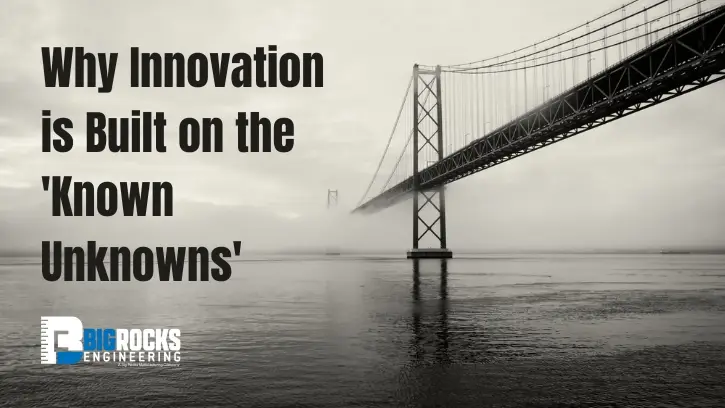
Why Innovation is Built on the 'Known Unknowns'
Introduction
Innovation often comes wrapped in uncertainty. As someone with over 20 years of experience in engineering and product development, I’ve learned that unpredictability isn’t a roadblock—it’s a reality. Whether you’re designing groundbreaking technology or refining an existing product, success lies in embracing and managing the “known unknowns.”
The Reality of New Product Development
In every project, there are challenges we anticipate but can’t define. My MBA professor aptly called these the “known unknowns.” These are elements we know exist but can’t fully quantify or predict. They’re why prototyping and Eric Ries’ concept of the “minimum viable product” are essential. A prototype is more than a model; it’s a tool to uncover what we don’t know yet.
The Myth of Perfection
In my early career, I fought hard to stick to timelines and budgets. I argued, stressed, and even jumped up and down when things didn’t go as planned. Over time, I realized this frustration wasn’t just mine—it was universal. No matter how carefully you plan, unforeseen challenges always arise. From simple projects to the most complex designs, the path to innovation is rarely smooth.
Lessons from History
Look at history’s most celebrated innovators. Edison’s lightbulb didn’t work the first time—or the thousandth. Steve Jobs didn’t create the Macintosh without significant delays and budget overruns. Yet, their persistence transformed industries. The lesson? Perfection isn’t the goal; progress is.
Why Prototyping Matters
Prototyping is the ultimate way to manage the “known unknowns.” It’s not just about testing a concept—it’s about uncovering issues early, learning from them, and improving. Whether you’re building flow control devices or heavy trucking equipment, prototyping mitigates risks and builds confidence.
Navigating Uncertainty with Partners
For fellow business leaders, partnering with experienced engineering firms can make all the difference. Deadlines and budgets are always top of mind, but the right partner will approach these with transparency. When timelines shift or unforeseen costs arise, collaboration and communication keep progress on track.
Conclusion
Innovation isn’t about avoiding uncertainty; it’s about managing it. By embracing the “known unknowns,” leveraging prototyping, and finding trusted partners, you can turn challenges into opportunities. Remember, every delay, every hiccup, and every unexpected turn is a step closer to a breakthrough.
About the Author

Mike Hill is the founder of Big Rocks Engineering, an innovative engineering firm specializing in product development, manufacturing solutions, and consulting services. With over 20 years of experience in physics, aerospace defense, and engineering, Mike has dedicated his career to solving complex challenges for OEMs and manufacturers. His passion for innovation and efficiency drives his mission to help companies bring their ideas to life through cutting-edge technology and strategic planning.
Through his leadership, Big Rocks Engineering has become a trusted partner for businesses seeking expert guidance in tackling the “known unknowns” of product development. Connect with him on Linkedln.




